#air nomad genocide
Explore tagged Tumblr posts
Text
ppl who fail to comprehend anything about Aang’s character literally sound like this whenever they speak on him
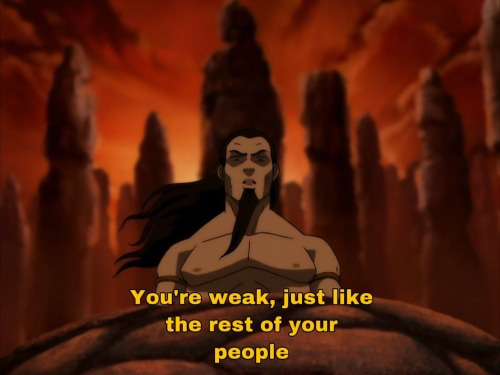
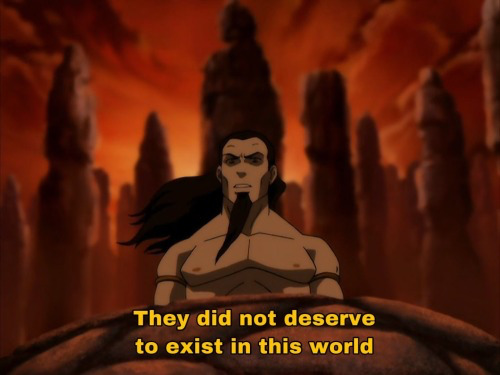
they’re always sayin shit that is borderline this dialogue lmao, like “oh he’s selfish” “oh he’s so weak” “I wish he would die” etc etc. like calm down Ozai Jr, I don’t think this show was meant for you!
#Aang#aang defense squad#aang deserved better#aanglove#Ozai#air nomad genocide#avatar the last airbender#atla
174 notes
·
View notes
Note
The hatred for air nomads is so fucking weird? I was scrolling through posts because reasons and if you've read reckoning of roku you must know the one dialougue gyatso has where he quips back to roku that if everyone was a pacifist there won't be much problems and says maybe I should travel the world to spread these teachings. And someone literally wrote :
Really, Gyatso? That sounds familiar. Looks like Sozin just beat him to the punch of SHARING their GREATNESS with the rest of the world. Oh my god...because sharing teachings peacefully by holding peaceful gatherings, giving speeches, having talks is SO SIMILAR TO FUCKING COLONIALISM? How did that simple line get so badly translated? also, it was tagged anti-bryke...don't get me wrong I don't believe that they're some kind of saints but bryke didn't even write the reckoning of roku... I've seen so many similar writings about it. All of them thinking bryke wrote the book too. It's so annoying.
X
#anti fire nation stans#anti Sozin dick riders#air nomads#air nomad genocide#monk gyatso#Roku#Sozin#the reckoning of roku#atla#atla confessions
34 notes
·
View notes
Text
Yknow, i'm rewatching atla after reading the yangchen novels, and I really appreciate the small meaning behind some things a lot more now. In s3 e11 The Western Air Temple, combustion man shows up and wrecks the place. I always found this sad because the preservation of air nomad culture and architecture was something shown many times to be important to Aang, so the temple being destroyed is really tragic in that way. But also, Yangchen is a western air temple nun. And we can see statues of her there in the episode. So reading the novels and then seeing how her statue is focused on more at the western than any other is a nice touch that shows how much detail the og show had in it. These little nods to what eventually would become lore is amazing.
But as much awe as it inspires, theres symbolism without (imo) even trying to be. In the Yangchen novels, combustion bending is seen for the first time in the atla world, it was written as the biggest plot point and the worldwide threat of the novels. And we see Yangchen and her struggle against it. Things like Nujians death, Yangchens banishment, all of her struggles in the novels are some sort of result from her dealing with combustion benders. And she is from the western air temple. Which is salt in a centuries old wound. Yangchen, an air nomad, a pacifist by culture, who worked so hard to avoid taking lives when she was able, who lost so much because of combustion bending as a technique, who came from the western air temple,
Her home, was destroyed
By the very
Technique
That cost her so much already.
#yangchen#dawn of yangchen#legacy of yangchen#avatar yangchen#avatar aang#combustion man#sparkysparky boom man#avatar the last airbender#western air temple#air nomads#air nomad genocide
113 notes
·
View notes
Text
How must the average fire nation citizen have felt after Ozai's defeat and Zuko's subsequent coronation?
Like, you're a fire nation citizen. You're a farmer or a scribe or a shopkeep or whatever. A regular person. All your life you've been told that the century spanning war that's going on is a good thing. It's the fire nation spreading its civilisation to the rest of the world and making it better. You've been told that the other nations need to be made better, and you believe it because you've never known anything else to be true. You've never met someone from somewhere the fire nation hasn't controlled for most of the war so you assume that these things you've been told about the other nations, that they're savages and ignorant and need the fire nation's benevolent help to be better, are true because you don't know any better, and all of the firelords from Sozin onwards have done their hardest to convince you of that. You've never known a world that wasn't at war, one that your people have been wining.
You're told that the genocide of the air nomads was a good thing. They had an army. They were threatening the fire nation's safety. Of course the great firelord Sozin defeated them because they were a threat. This is a good thing. You don't question this because it's all you've ever been told, and it's all the firelords want you to know about it.
You're told that the other two nations, the water tribe and the earth kingdom, are savages, stupid and violent, dangerous to themselves and others. You're told that the war is a March of Civilisation, your nation is helping them to be better, less savage, less violent, less stupid, less of a danger. This is a good thing. This is all you know about the war.
One day, you're told the avatar has returned. You're told that he's a threat to your nation, that he's monstrous and dangerous and needs to be stopped. You're told he's travelling with some savages from the other nations that are equally as dangerous and bad and awful because they want to stop your nation from bringing peace and civilisation to the world. You don't like the avatar because this is all you know about him.
You're told that Princes Zuko and Iroh, the firelord's firstborn and the dragon of the west, have become traitors to the fire nation and are now wanted criminals. You're told of Zuko's lack of skill in firebending, his insanity after his father defeated him in an Agni Kai, his honour honourless existence after he questioned the firelord. You're told of Iroh, the previous dragon of the west and general in the army, how he went insane after the death of his son and betrayed the nation. You think that they are bad, because they are traitors to the nation, dangerous criminals. You never consider why they changed sides because, to you, the fire nation is a good thing. What your nation is doing is a good thing. This war is a good thing.
Ozai is defeated on the day that you've been told he will take the earth kingdom and help them be better.
You're told that of new firelord, Zuko, who you had been told previously was a traitor, who allied with the avatar to defeat Sozin, his father, was, in fact, right to betray the fire nation. You're told the ugly truth about the war that you always thought was a good thing. You're told about the air nomad genocide, the near total eradication of southern water tribe, the torture of prisoners of war, the deaths of so many earth kingdom people, the deaths of every young man sent to fight for his nation on either side of the war, the casual cruelty of the fire nation soldiers to those under their thumb, the horrors commited by your nation and you realise that no. Your nation is not good. Your firelords were not good. You are not good.
You hear about the deaths of so many innocents, their blood staining your nation red.
How do you move on from the total destruction of everything you thought to be true? How do you cope with the horrible reality of it all? What do you do now you know?
So, yeah. I wonder how the average fire nation citizen must have reacted to Ozai's defeat and Zuko's coronation.
22 notes
·
View notes
Text
Something that just occurred to me? If you consider the Avatar Legends RPG canon, then the Air Nomad genocide is even more terrible. Because some of those Air Nomads would've been people of Fire Nation descent.
#Avatar#avatar the last airbender#Atla#Avatar legends#Avatar rpg#fire nation#air nomads#airbenders#air nomad genocide
22 notes
·
View notes
Text
Bones
Skeletons of war aren’t in the closet, they hide in plain sight.
The first sign of war is on display in each one of the air temples: actual skeletons of a people who were killed amidst kindness, left hollow by the passing of a century.
The Fire Lord who helped end the war will return to one of these temples, years after the war has been won. He will go alone, and he will scour the Southern Air Temple for weeks.
When he returns, he will gift the Avatar with the record of his birth, found in a library turned to dust, dirt, unburnt.
The Avatar will cry, and feel more connected to his new family and his old than he ever has before, but the Fire Lord knows the Air Nomads will never come back.
The second sign of war is the soldiers through the Earth Kingdom, disciplined and barbaric alike.
The same Fire Lord will remember a young boy with his brother stolen for the front lines, who turned on him when he knew who he (his family, his legacy) really was. He will remember a girl’s kindness, repaid in rapacity. He will remember all the the charred earth he had seen, and a boy who died beneath a lake.
The villages will be rebuilt, the soldiers brought home, and a baby ostrich horse will find a new home. A Fire Nation village, nestled in an Earth Kingdom forest, will be instructed to leave the intricate hideouts in the trees where they are.
The Fire Lord won’t stay in these towns long enough to hear them say thank you, feeling he would break if he ever heard such a lie as gratefulness to him.
Third, the destruction of the Southern water benders, an entire bending discipline now resting on the shoulders of a single water bender, made terrified by the prospect of unyielding control under the light of a full moon.
He will release the prisoner who had taught her to blood bend into the water bender’s custody, and lets her decide what she sees fit (she looks into her eyes, blue bearing into gray, and demand imprisonment for eternity, both in body and in spirit).The young Fire Lord will see the relief and gratitude in her eyes, and ignore the loud protests of his advisors, who wanted the woman executed. But looking at Katara, he feels as though the Fire Nation should get no say in the matter.
And the fourth is the Fire Lord himself, broken by a lineage of war and deceit, and even though he tries, even though he is reassured he has done more than what anyone expected of him, gone above and beyond, he will never be able to shake the feeling of guilt for a heritage he did not choose.
He hides this skeleton in the closet, and smiles for the other nations, for his friends, but he feels it in his bones and in his soul. Every night he takes out the skeleton he made of these bones and dances with it, in the form of pacing, shaking, the thought of rest ever so a foreign concept. The night he arrives at the Southern Water Tribe (for the second time) greeted by Sokka with an embrace (he remembers tossing him to the side before), he will lay awake and clench his jaw, trying so hard not to think about Katara, the last water bender in the south pole. He will help rebuild the villages and towns and pay reparations to the Earth Kingdom, doubting his choice only in the case of Yu Dao, and even years later, is scared to think he actually made the wrong choice. He will help the Avatar rebuild the ties to the spirit world, replanting trees into a lush forest, a statue watching them gratefully in the distance. He will grip his hands, plaster a smile on his face, when Aang’s voice hitches when he talks about the air benders, and waits until he is alone at night to sob.
The Fire Lord is haunted by ghosts and bones alike, the balance within him forever off kilter. So the Fire Lord carves every lost water bender, every Earth Kingdom family ripped apart, and every air nomad corpse into his own bones, a promise to always be redeeming, a darkness he takes with him to the grave.
#my boy zuko needs a hug#i can only write aangst i'm sorry#trade offer: i receive pain and you also receive pain#avatar#atla#avatar the last airbender#fire lord zuko#fire nation#atla zuko#zuko#avatar aang#katara#waterbenders#earth kingdom#guilty zuko#sokka#air nomads#air nomad genocide#air temples#aang#aangst
4 notes
·
View notes
Text
Correct. Korra did something very important as the Avatar, but it was to allow the spiritual connection that re-established Air Bending. It didn't rebuild the culture. Even in the show, that's Tenzin and the other Air Acolytes who preserved what they could of the culture, and this is shown outright.
"Korra brought the air nation back"
I hate this take so much. She didn’t. YOU CAN'T FIX A GENOCIDE. The air nation, the air nomads and their culture are gone
Korra brought the AIRBENDERS back. Two different things. Air Nomads as a culture were preserved thanks to Aang and the Air Acolytes
Aang fought his whole life for this (and sometimes he gets hate from the fandom bruh)
295 notes
·
View notes
Text
say a solemn prayer
pairing: Aang x Katara
word count: 7,365

A/N: so I haven't written a kataang fanfic in about 13 years, now, but with ATLA's continued renaissance, I felt compelled to write this. I did do a lot of research into different cultural burials, but I only took inspirations to write this. the idea behind this one shot was that I've always been so sad thinking about how Aang never gets to perform a burial for his people given he doesn't have the time in the canon show, so that was why I wanted to write this. also, I love kataang and they were legitimately the first pairing I ever actively shipped so writing this was so fun (and sad) for me.
summary: As a little girl, she had believed in the Avatar as one believed in a deity. Something not of this world, able to quake the fabric of the earth with a single step. The Avatar existed in her mind as something abstract and removed, cold like the moonlight that gave her bending its power and blinding like the tundra that stretched endlessly beyond the walls of their village.
It hadn’t been until Aang had crumpled at her feet, body crinkling like a leaf against flame and wailing over his people that she had truly thought otherwise.
OR
Katara and Aang travel to the Southern Air Temple after the war to perform a funeral for his deceased people.
#my writing#my fics#kataang#pro kataang#kataang fanfic#kataangtag#avatar the last airbender#atla#Katara#Aang#air nomad genocide#monk gyatso#atla fanfic#katara x aang#aang x katara
73 notes
·
View notes
Note
Sozin really murdered the love of his sister's life and all her people in cold blood, as bad as the sibling relationships have always been in the Royal Fire Nation family I don't think any of them have beat that
X
#Sozin#princess zeisan#zeisan#the reckoning of roku#fuck Sozin#atla#atla confessions#air nomad genocide
23 notes
·
View notes
Text
It really is a low bar to say that genocide is bad and the people who are the victims are not in the wrong for their own genocide. Yet, somehow people are tripping over this bar.
The discourse over Reckoning of Roku is really driving me up the wall becos you really have fans (namely Zutara stans) saying that Gyatso was just as bad as Sozin for saying that the Air Nomads should spread their teachings around the world. Now, an argument can be made over how wanting to teach one's philosophy/religious beliefs can be seen as a form of religious supremacy and at its worst, could be a slippery slope to neocolonialism. And these ideas could honestly be interesting to explore within the world of ATLA given how idealised the Air Nomads have been depicted, seeing a less flattering side to the Air Nomads would add a layer of worldbuilding. However, the argument that Gyatso is just as bad as Sozin can be burned to fucking ashes when the show depicted Sozin orchestrating the genocide of the Air Nomads, Gyatso being one of the victims. So, no matter how bad the Air Nomads can be, at least they have never orchestrated fucking genocide??
And then there was one user who wrote about how it would have been cool to explore how the Air Nomads' negative side could be one of the key reasons to their downfall, and it really rubbed me the wrong way becos the wording kinda implies that the Air Nomads were complicit in their own genocide. Like it doesn't matter if the Air Nomads were wrong or whatever, the Fire Nation should never have committed genocide in the first place??
26 notes
·
View notes
Text
The Good & the Bad: On Aang (Not) Killing the Fire Lord

I recived this asks forever ago, trurly sorry anon, but I'll keep my apologises for the end. I'd love to answer that!
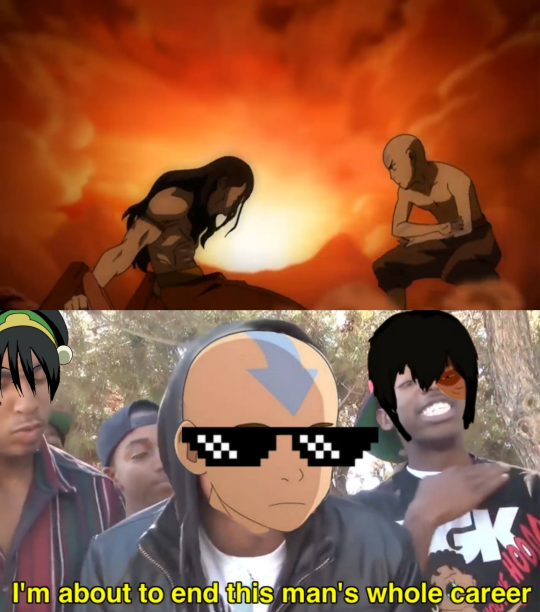
If you're asking me, this is way better than """killing him""". Case closed.
Getting this cleared up: The show didn't say that Aang is morally superior for this. It was solely about staying true to himself. Not a moral high ground.
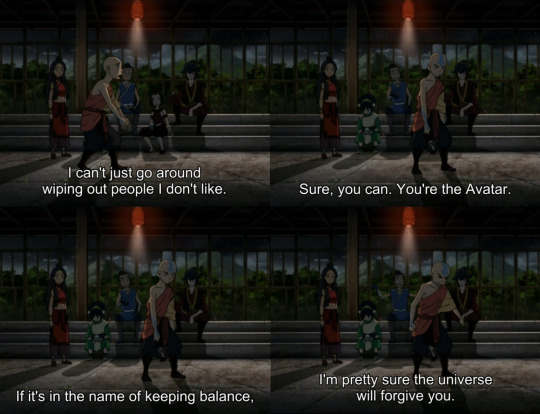
So when I hear people say it's problematic because it implies that sparing imperialistic dictators has some intrinsic goodness to it, (Ahem-Lily Orchard), I just can't agree. It was never about universal ethics, it was about Aang's culture and values.
Why Is This a Good Thing?
Aang loves his culture, and takes a lot of pride in it and its values. (See: in The Southern Raiders his first go-to to convince Katara to spare Yon Rah is his culture, rather than what such act would do Katara herself). He would have been ashamed if he had broken them. But right now they clash with his Avatar duties, with god-knows how many lives at stake. He needs to let go of his pride & shame, and become humble.
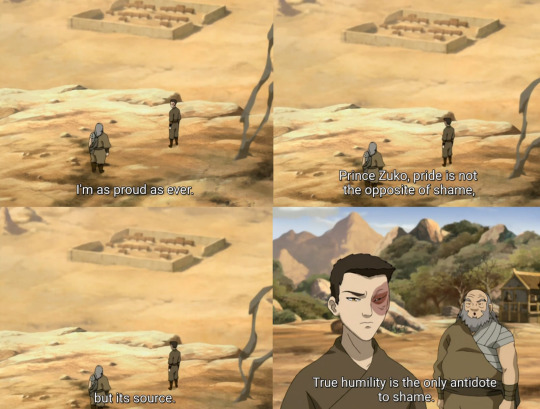
Just like Zuko humbling himself to the GAang before they accept him, or Sokka humbling himself to the Kyoshi warriors and Master Piandao, Aang could only speak to the the lion turtle after he'd given up, after he was humbled.
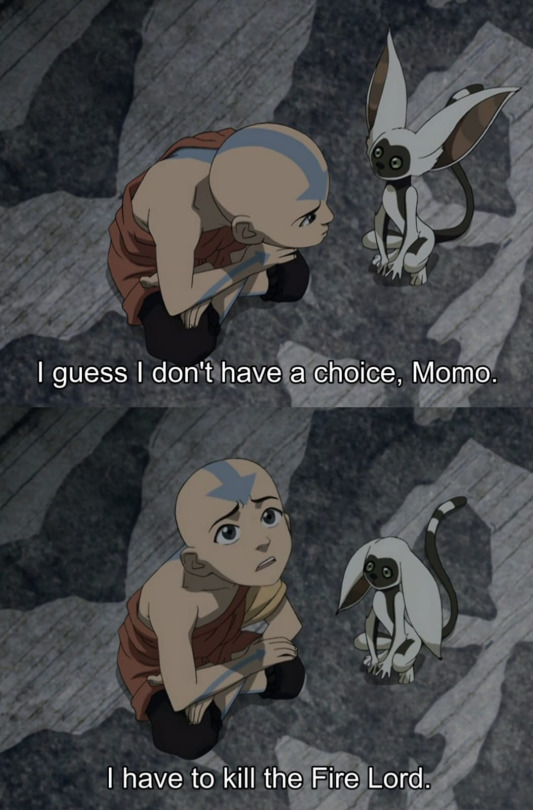
Even beyond Aang, it enhances the show's themes at large. A theme in A:TLA is paving your own path, and that you can do what you want despite the pressure. Your true destiny will come, you might be surprised by it, but it's yours and you're free to carve it.
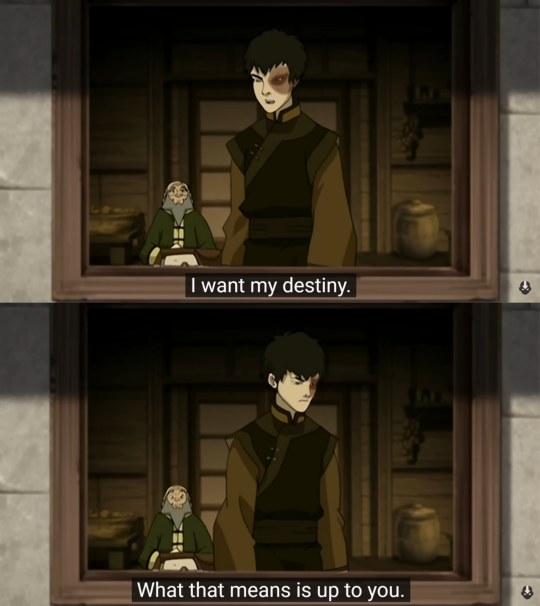
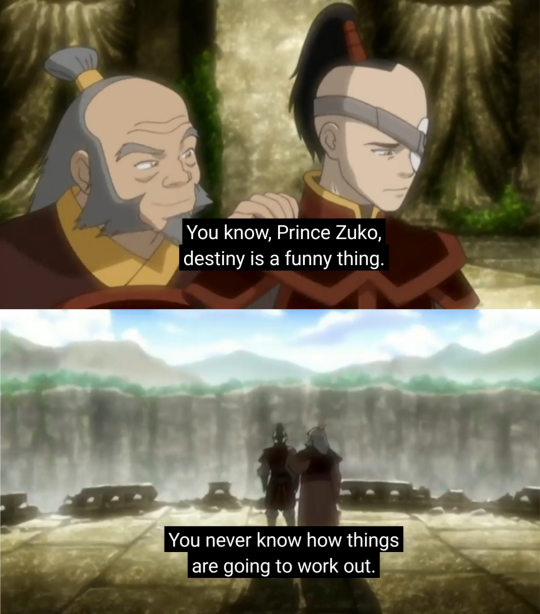
You just have to keep going, to continue to do the right thing, and your destiny will find you. Things have a way of working out in the end, eventually.
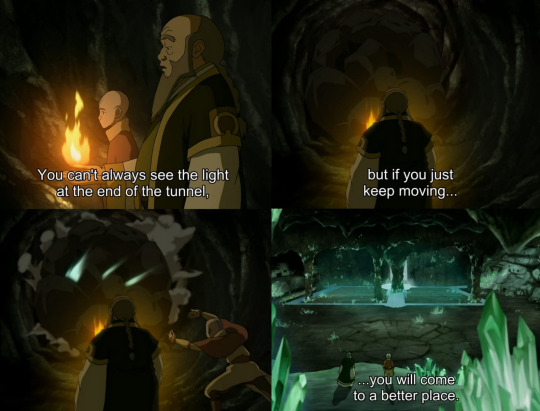
Sparing Ozai serves the theme, thus the show overall. Everyone told him it's his destiny to kill the Fire Lord and end the war. But he didn't agree, paving his own path, his own destiny, and all was well. The pieces fell in their place.
It is s amplified by the fact that if you read between the lines, he actually did follow all the previous Avatars' wisdom besides Yangchen's.
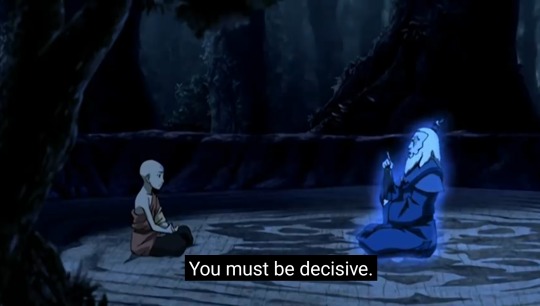
Aang knew what he wanted from the start. He isn't going to kill the Fire Lord. People (rightfully) tried to pressure him, but in the end, he stuck to his decision.
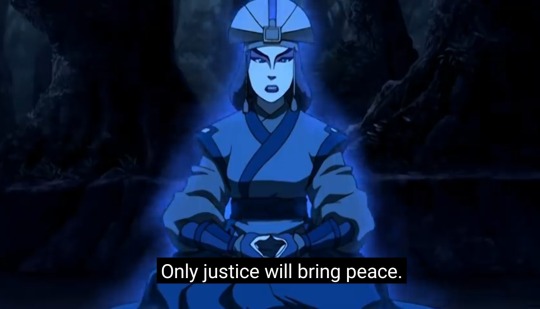
Justice was served. Aang took his bending away and put him to rot in prison for the rest of his life. There's more than one way to execute justice.
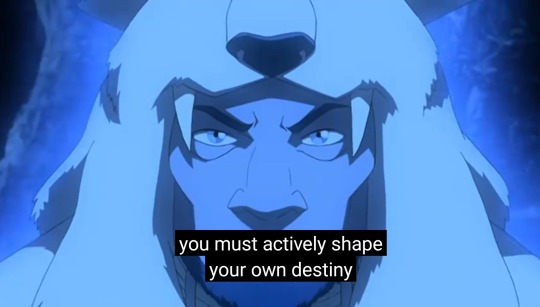
"... and the destiny of the world". That's exactly what Aang did. He followed his own path (staying true to himself) while saving the world (ending Ozai regime).
So that leaves us with Yangchen's advice. The one he didn't follow:
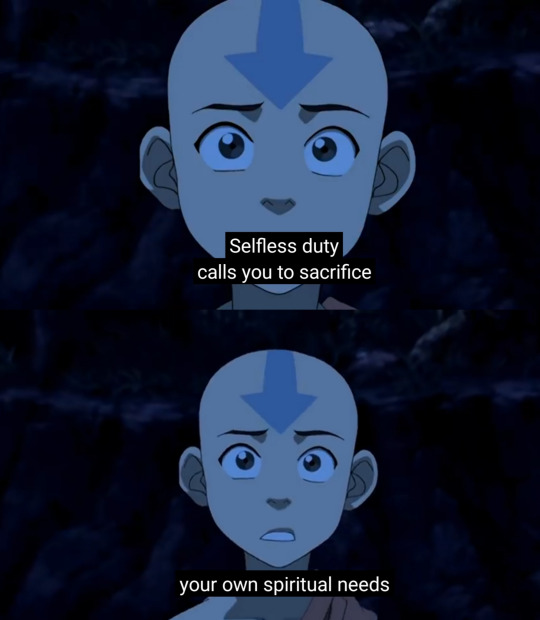
This opens another layer to this. Why doesn't Aang take the advice of a fellow Air Nomad? The one he should relate to the most? Because despite both being Avatars and Airbenders, Aang is the last. They're not the same. Yangchen is speaking from a place of privilege. She can carry the weight of the Avatar and not worry about the Air Nomads. Notice the wording: "spiritual needs". But it's deeper than that. In her time, they were there, they'll preserve their culture and values. Aang doesn't have that.
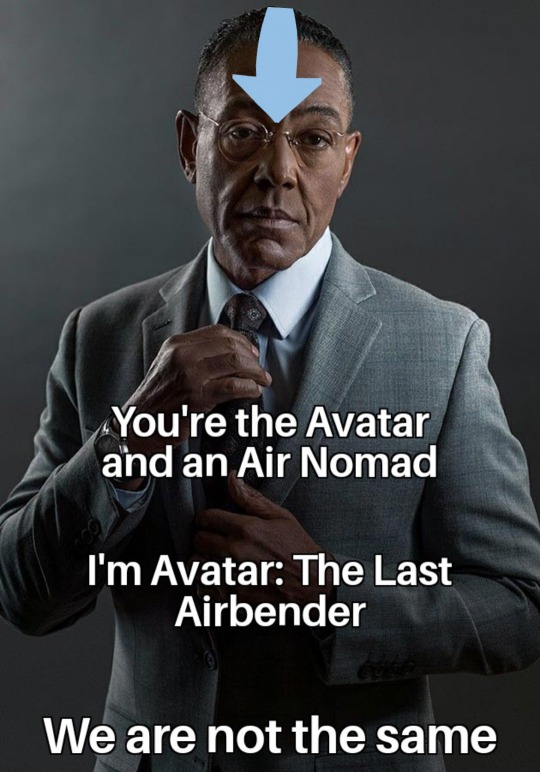
He's Avatar: The Last Airbender. He has both weights to carry. The decision to spare the Fire Lord, while protecting the rest of the world, is embedded in the show's title.
There's also something so incredibly powerful in Ozai being defeated specifically with Air Nomad values. A 100 years ago, during Sozin's Comet, the Fire Nation started the war by genociding them. When it comes back, the Avatar, the last Air Nomad, ends the war and stops the next genocide while preserving their values. The Fire Nation isn't going to push him to taint (one of) the last living aspacts of the Air Nomads, and Aang is shouting it – in the very same day the disaster occurred.
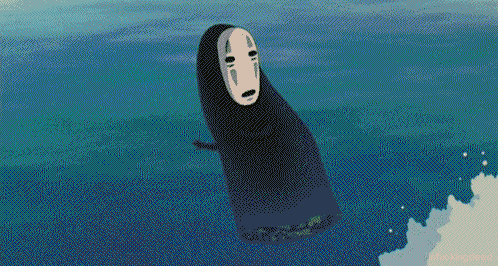
(Additionally I view this as a land mark of his character development since Siege of the North. He used spirit powers for murder, now he's using them for mercy).
(A:TLA is also a show made with kids in mind. They may not be able to make Aang kill Ozai. He got his bending stolen and sentenced to prison for the rest of his life. That's a more than serviceable punishment for a show aimed at kids).
(Ps: If Ozai had died Zuko would never have found out where his mother is).
The concept is fantastic. Nothing wrong there. But now, it's time for the critisism.
What's the problem then?
Despite looking in internet forums, it's entirely possible that I missed some things. With that being said, the Lion Turtles could have been foreshadowed better. As I stated, I don't mind it. But as far as I recall, it was foreshadowed once in The Library, and that's it. (Edit: It's also foreshadowed in Sokka's Master and The Beach, but the point still stands).
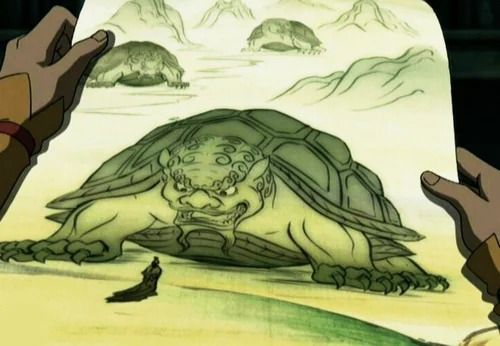
The Lion Turtle is a twist, it subverted expectations, but that doesn't mean it has to be a deus ex machina. That's what foreshadowing is for. It's the literary device to making a plot twist feel believable. The result is many fans, including me, feeling as though it came out of no where, even though it didn't.
Overall, I love that Aang spared Ozai. It ties into the themes of the show and Aang's role as the last airbender. It makes perfect sense, it's rather beautiful. However, I do wish the foreshadowing was better.
And for Anon, to apologize for the wait, I dedicate you this meme:
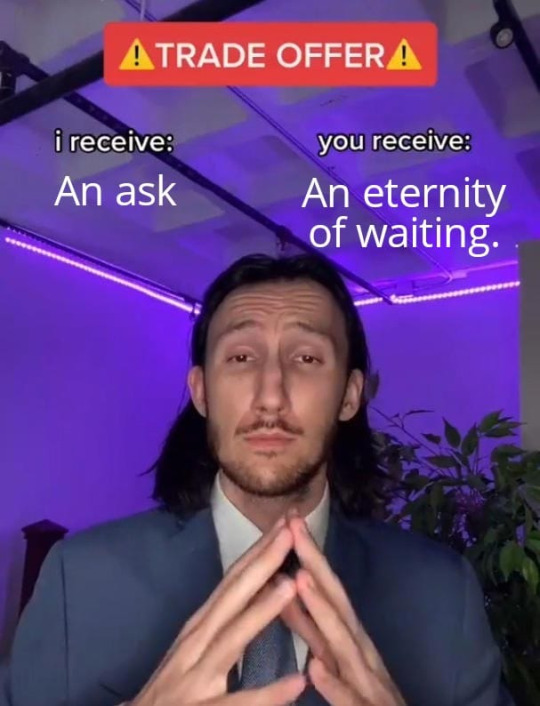
#tw genocide#aang#avatar aang#lion turtle#ozai#fire lord ozai#atla meta#avatar meta#aang meta#atla ending#atla finale#avatar: the last airbender#avatar the last airbender#air nomads#yangchen#kyoshi#roku#kuruk#avatar yangchen#avatar kyoshi#avatar roku#avatar kuruk#tw imperialism#avatar the last airbender meta#atla analysis#aang analysis#atla aang#atla critisism#iroh#uncle iroh
242 notes
·
View notes
Text
I think an important change NATLA made was to show the Air Nomads before the genocide - in the canonical timeline, rather than just memories of them after we knew they were all dead.
There's a reason kid's shows find it very hard to get approved character deaths of people we met, got to know, THEN have them be killed off (see: Jet) - it's much more impactful than already knowing someone is dead and then being shown a memory of them.
In the animated version, the fate of the Air Nomads is a foregone conclusion: they are a dead culture that was simply destined to die. Seeing the Air Nomads before the genocide in the live-action really humanizes them to the audience and shows that they were a real, living and breathing culture - not just one fated to die.
When you show only the aftermath of a genocide, it's easy for people to file that culture and people away in their head as 'dead' and it feels…normal(?) that they no longer exist - I think it's so incredibly important to show that these people were not just text on a page in a history book, but real, living people who didn't deserve to die - their destruction isn't "just the way it is" but rather was forced on them by terrible, power hungry people - they didn't just 'stop existing', they were murdered.
In a young children's show, you can show the aftermath of a war, you can have people who died in the past, but it's very difficult to show someone alive and well (develop them as a character with a name and story and interactions with the main cast) and then kill them off - I honestly can't think of a character in the OG that died after we had known them while they were alive (other than bad guys) - even with Jet, they couldn’t explicitly say he died.
We can ASSUME characters like Hahn died, but they just get thrown off the screen and no one ever mentions them again - Yue 'dies', but not really - her soul floats up to the moon after kissing and saying goodbye to Sokka, so it's not really a traditional death kids could get scarred from.
In the animated series, Gyatzo is only seen through memories, we already know he's dead so there's no emotional shock
The live action was able to push past those age restrictions and show people alive and well and then show that their lives were ended as a calculated and purposeful action
#natla#natla spoilers#avatar the last airbender#atla spoilers#air nomads#atla netflix#atla live action#I know some people are saying showing it was 'gratuitous' but i think it's incredibly important to not 'sanitize' genocide
83 notes
·
View notes
Text
‘so long london’ is about roku & sozin.
#‘and you say i abandoned the ship but i was going down with it’#THE breakup of all time#sozin wanting to rule the world with roku by his side#roku having to leave to train to be the avatar and both boys knowing they will never be the same again#because it’s not roku&sozin anymore#it’s crown prince sozin & avatar roku#and sozin always put roku first but roku had to put the world first#fire lord ‘duty is the death of love’ sozin#and avatar ‘love is the death of duty’ roku#two graves one gun#sozin leaving roku to die#sozin wiping out the air nomads & his ex bff in one fell swoop (he failed but he don’t know that)#sozin: *gets heart broken* fuck it we ball *commits genocide and starts a century long war*#he had a nation to run but all he could think about was roku#so much so that couldn’t do his job properly until he left roku to die#(i know it’s because roku stopped him but it kinda seems like he couldn’t focus on conquering the world because he was thinking about roku)#the fact that on sozin’s deathbed he was STILL going on and on about roku#sozin: *occupies earth kingdom territory to get roku to notice him* roku: go sit in the naughty corner and think about what you did#rozin#roku x sozin#avatar roku#fire lord sozin#reckoning of roku#roku and sozin#sozin x roku#atla#the reckoning of roku#they’re just so…#i LOVE them. genocidal warmongering & all#useless twink activities and all
28 notes
·
View notes
Text
Spirit World Shenanigans
Yangchen running into the room: Korra just said she doesn't love me anymore! Aang: What?! Korra following her in: I did not say that. I just said that we are not driving all the way across the Spirit World just so you can punch Roku in the face. ----- While planning to break in somewhere Korra: Hey, let's do "Get Help!" Kyoshi: What? Korra: "Get Help." Kyoshi: No. Korra: C'mon, you love it! Kyoshi: I hate it. Korra: It's great! It works every time! Kyoshi: It's humiliating. Korra: Do you have a better plan? Kyoshi: No. Korra: We're doing it! Kyoshi: We are not doing "Get Help!" A Minute Later Korra, carrying Kyoshi: Get help! Please! She's dying! Help her! *throws Kyoshi at guards, knocking them out* Korra: Ahh, classic! Kyoshi: *gets up* I still hate it. It's humiliating. Korra, laughing: Not for me, it's not.
-----
Kyoshi: It’s impossible to make a sentence without using the letter A. Roku: Despite your thinking, it is quite possible, yet difficult, to form one without the specific letter. Here’s one more to further disprove your theory. Kuruk: F*ck you.
#atla#atla incorrect quotes#past avatars#avatar yangchen#avatar korra#avatar aang#avatar roku#avatar kyoshi#avatar kuruk#if you want context for the first one#Roku brought up the Air Nomad Genocide#Yangchen isn't happy
56 notes
·
View notes
Text










ARE YOU ALL SEEING THIS?? I'M SO EXCITED, IT LOOKS SO GOOD
#atla#atla live action#avatar live action#avatar the last airbender#the teaser opens with actual scenes from the air nomad genocide#!!!#i had chills#goosebumps#i gasped#i screamed#avatar netflix#netflix atla#netflix avatar#atla netflix
42 notes
·
View notes
Text
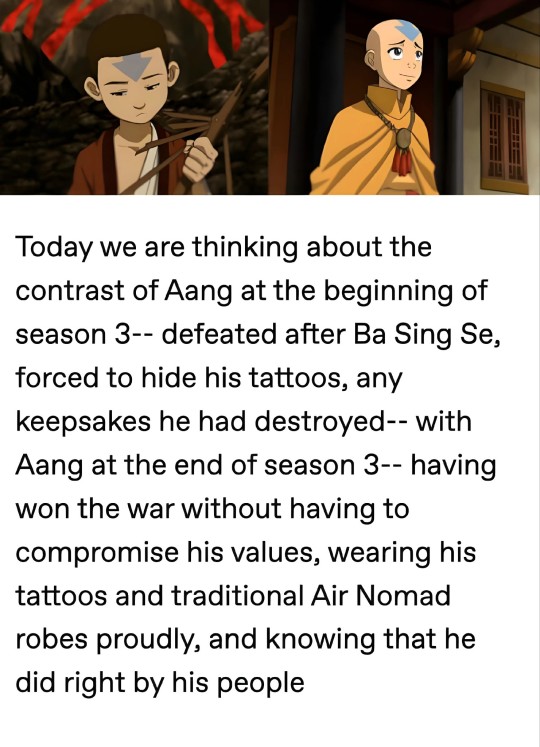
Ok i'm crying bye
203 notes
·
View notes